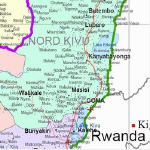
The United Nations estimates 20,000 civilians in eastern Congo have been forced to flee their homes over the past week as violence increases along the volatile border with Uganda.
The latest fighting has scattered people in the Beni region, located in the northernmost part of the Democratic Republic of the Congo's North Kivu province.
This past week, the Congolese Armed forces has been trying to root out the remnants of the Allied Democratic Forces, a Ugandan rebel group that has remained dormant for several years in North Kivu.
The number of displaced is a conservative estimate, warned U.N. spokesman Maurizio Giuliano, adding that actual total may actually be much higher. Giuliano said 14,000 of the displaced have registered with humanitarian organizations responding to the conflict, and at least 2,000 have received official assistance.
Internal displacement is not a new phenomenon in the Democratic Republic of Congo.
Nearly two-million people have been displaced inside the country, and at least one-million others were forced out in 2009, according to the United Nations.
Despite the Congo's long history of internal conflict, the U.N.'s Giuliano said the rapid escalation of the situation in Beni has been particularly alarming.
"That is the shocking thing. It has been happening last week. According to some sources it even happened in one single day. This is what is shocking because that particular territory, Beni Territory, hosted 10,000 internally displaced persons, which had been displaced over a couple of years. Therefore to get 20,000 internally displaced persons in one week is considerable," Giuliano said.
The U.N. is preparing for more displaced persons and Guiliano said the organization's rapid response mechanism is ready to handle another influx.
The Allied Democratic Forces have been operating since 1996 out of the border region near the Rwenzori Mountains of eastern Congo. The group was most active in the late 1990s and was designated a terrorist group by the United States after a string of bombings in Uganda.
The recent reemergence of Allied Democratic Forces coincides with accusations made by the Ugandan government that the group played a role in the twin bombings Sunday that killed 76 people in Kampala.
Somali Islamist group al-Shabab has admitted to carrying out the attacks as retaliation for Ugandan peacekeeping forces in Somalia. The founding members of the Ugandan rebel group included fundamentalist Muslims, but experts say the connection is unlikely and Ugandan officials have not provided evidence linking the two.
Related articles
- • Canada and Germany Impose Sanctions on Rwanda for Supporting M23 Rebels (March 4, 2025)
- • US Sanctions Rwanda's Minister James Kabarebe for Central Role in DR Congo Conflict (February 20, 2025)
- • Rwanda-Backed M23 Rebels Summarily Executed Children in Bukavu, UN Reports (February 19, 2025)
- • 'Deadly environment' plus 'political and social' obstacles hinder Ebola fight, Security Council hears (July 24, 2019)
- • Ebola outbreak declared an international Public Health Emergency (July 17, 2019)
- • Constitutional Court Declares Tshisekedi Winner of Presidential Election (January 19, 2019)
- • UN Report Blames Ugandan Islamists for 237 Killings in DR Congo (May 14, 2015)
- • Denis Mukwege Wins Sakharov Prize 2014 (October 21, 2014)
- • Violence in North Kivu Kills 21, Mostly Women, Children (October 18, 2014)
- • Kerry Calls on Kabila to Honor Constitution (May 4, 2014)
- • Death toll in Lake Albert boat accident rises to 251 (March 27, 2014)
- • U.S. sending more personnel to Uganda to hunt LRA leader Joseph Kony (March 24, 2014)
- • Death toll in Lake Albert boat accident rises to 108 people (March 24, 2014)
- • DR Congo Takes Chairmanship of COMESA at Summit in Kinshasa (February 26, 2014)
- • New DR Congo amnesty law welcomed by UN envoys (February 5, 2014)
- • Colonel Mamadou Ndala Is Killed in Ambush (January 2, 2014)
- • DR Congo, M23 Rebels Sign Declarations Marking End of Kampala Peace Talks (December 12, 2013)
- • No 'Peace Deal' With Defeated M23 Rebels, DR Congo Says (November 11, 2013)
- • Congo Will Not Sign a 'Peace Deal' With Defeated M23 Rebels, Government Says (November 6, 2013)
- • Congo Army Takes Control of Mbuzi Hill From M23 Rebels (November 4, 2013)
- • Kabila Congratulates Congo Army for Defeating M23 Rebels (October 30, 2013)
- • Advancing Congo Troops Take Control of Rumangabo From M23 Rebels (October 28, 2013)
- • Congo Army Liberates Rutshuru, Kiwanja and Kibumba From M23 Rebels (October 27, 2013)
- • Congo Army Dislodges M23 Rebels From Strategic Town of Kibumba (October 26, 2013)
- • Congo Army Takes Control of Kibumba After Fighting With M23 Rebels Resumes (October 25, 2013)
- • U.S. Sanctions Rwanda Over Use of Child Soldiers by M23 Rebels (October 4, 2013)
- • Rwandan Support for M23 Rebels Frustrates Attempts to End Fighting in Eastern Congo (September 26, 2013)
- • Ban Ki-moon Confirms M23 Rebels Shelled Rwanda (August 31, 2013)
- • M23 Rebels Fired Shells Into Rwanda, Not Congo Army, UN Says (August 30, 2013)
- • Mortar Shells From Rwanda Kill Civilians in Eastern Congo (August 23, 2013)
Tags: |







